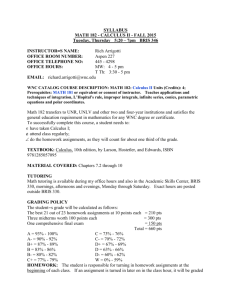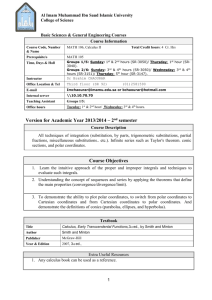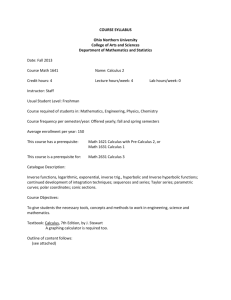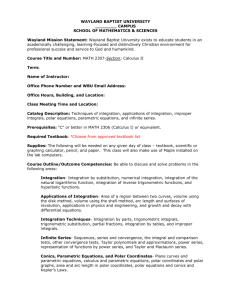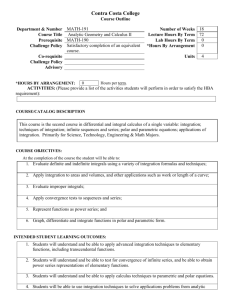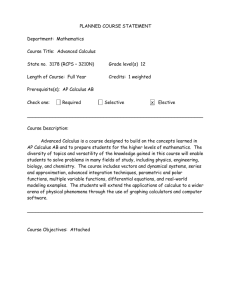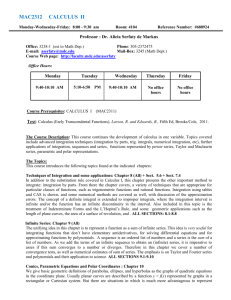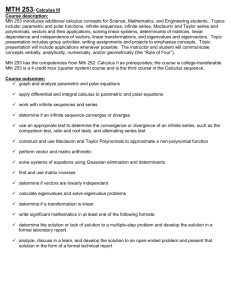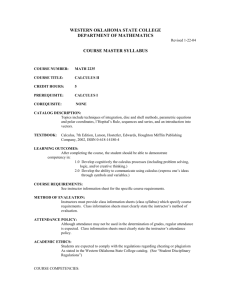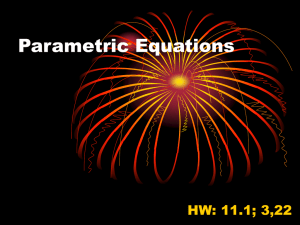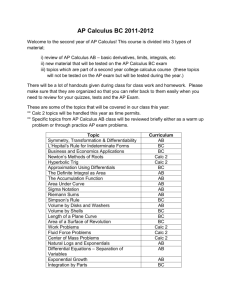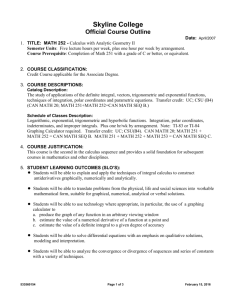MATH_211_MS - Baton Rouge Community College
advertisement
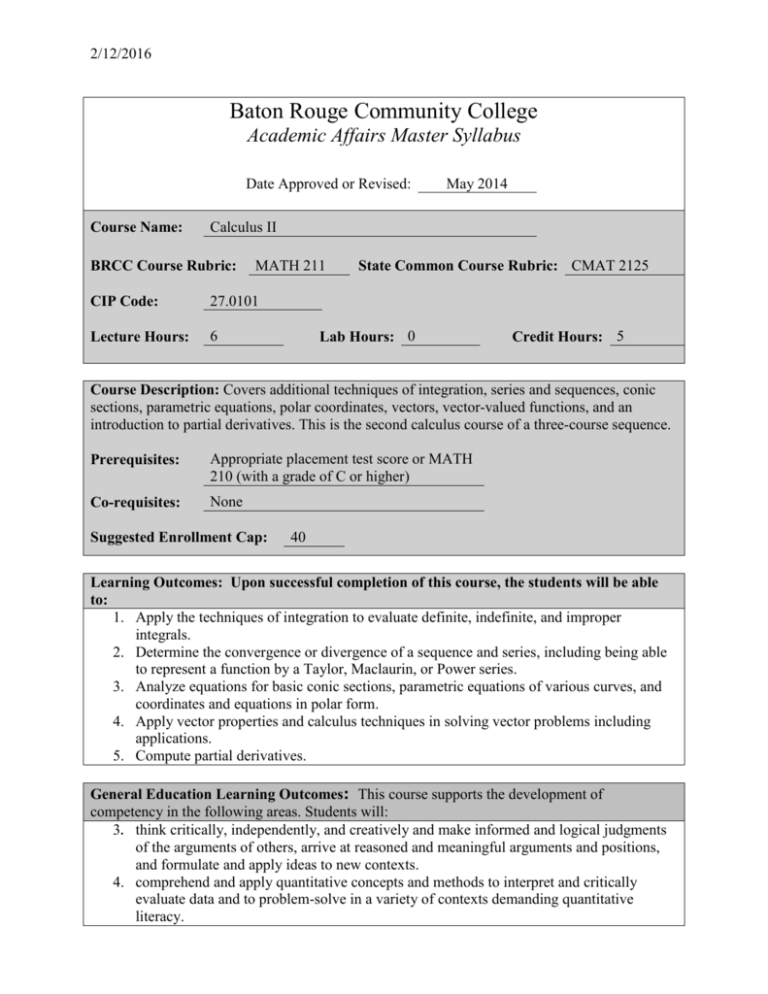
2/12/2016 Baton Rouge Community College Academic Affairs Master Syllabus Date Approved or Revised: Course Name: May 2014 Calculus II BRCC Course Rubric: MATH 211 CIP Code: 27.0101 Lecture Hours: 6 State Common Course Rubric: CMAT 2125 Lab Hours: 0 Credit Hours: 5 Course Description: Covers additional techniques of integration, series and sequences, conic sections, parametric equations, polar coordinates, vectors, vector-valued functions, and an introduction to partial derivatives. This is the second calculus course of a three-course sequence. Prerequisites: Appropriate placement test score or MATH 210 (with a grade of C or higher) Co-requisites: None Suggested Enrollment Cap: 40 Learning Outcomes: Upon successful completion of this course, the students will be able to: 1. Apply the techniques of integration to evaluate definite, indefinite, and improper integrals. 2. Determine the convergence or divergence of a sequence and series, including being able to represent a function by a Taylor, Maclaurin, or Power series. 3. Analyze equations for basic conic sections, parametric equations of various curves, and coordinates and equations in polar form. 4. Apply vector properties and calculus techniques in solving vector problems including applications. 5. Compute partial derivatives. General Education Learning Outcomes: This course supports the development of competency in the following areas. Students will: 3. think critically, independently, and creatively and make informed and logical judgments of the arguments of others, arrive at reasoned and meaningful arguments and positions, and formulate and apply ideas to new contexts. 4. comprehend and apply quantitative concepts and methods to interpret and critically evaluate data and to problem-solve in a variety of contexts demanding quantitative literacy. Assessment Measures: Assessment of all learning outcomes will be measured using the following methods: 1. Instructor created exams, quizzes, and/or homework. 2. Comprehensive final exam. Information to be included on the Instructor’s Course Syllabi: Disability Statement: Baton Rouge Community College seeks to meet the needs of its students in many ways. See the Office of Disability Services to receive suggestions for disability statements that should be included in each syllabus. Grading: The College grading policy should be included in the course syllabus. Any special practices should also go here. This should include the instructor’s and/or the department’s policy for make-up work. For example in a speech course, “Speeches not given on due date will receive no grade higher than a sixty” or “Make-up work will not be accepted after the last day of class.” Attendance Policy: Include the overall attendance policy of the college. Instructors may want to add additional information in individual syllabi to meet the needs of their courses. General Policies: Instructors’ policy on the use of things such as beepers and cell phones and/or hand held programmable calculators should be covered in this section. Cheating and Plagiarism: This must be included in all syllabi and should include the penalties for incidents in a given class. Students should have a clear idea of what constitutes cheating in a given course. Safety Concerns: In some programs this may be a major issue. For example, “No student will be allowed in the safety lab without safety glasses.” General statements such as, “Items that may be harmful to one’s self or others should not be brought to class.” Library/ Learning Resources: Since the development of the total person is part of our mission, assignments in the library and/or the Learning Resources Center should be included to assist students in enhancing skills and in using resources. Students should be encouraged to use the library for reading enjoyment as part of lifelong learning. Expanded Course Outline: I. Integration Techniques A. Basic Integration Rules B. Integration by Parts C. Trigonometric Integrals D. Trigonometric Substitution E. Partial Fractions F. Integration by Tables and Other Integration Techniques G. Improper Integrals III. Infinite Series A. Sequences 2 B. Series and Convergence C. The Integral Test and p-Series D. Comparisons of Series E. Alternating Series F. The Ratio and Root Tests G. Taylor Polynomials and Approximations H. Power Series I. Representation of Functions by Power Series J. Taylor and Maclaurin Series IV. Conics, Parametric Equations, and Polar Coordinates A. Conics and Calculus B. Plane Curves and Parametric Equations C. Parametric Equations and Calculus D. Polar Coordinates and Polar Graphs E. Area and Arc Length in Polar Coordinates F. Polar Equations of Conics and Kepler’s Laws V. Vectors and the Geometry of Space A. Vectors in the plane B. Space Coordinates and Vectors in space C. The Dot Product D. The Cross Product VI. Vector-Valued Functions A. Vector-Valued Functions B. Differentiation and Integration of Vector-Valued Functions C. Velocity and Acceleration VII. Introduction to Partial Derivatives 3
